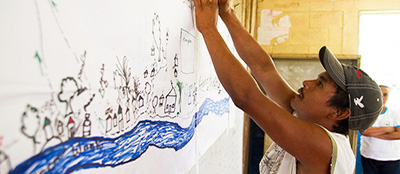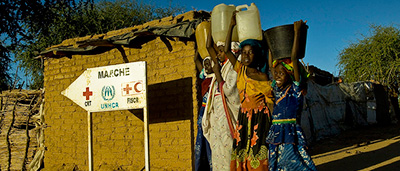Iffat Idris, GSDRC, University of Birmingham Pakistan has been in the international news twice so far this year. First, in spring 2025, for renewed conflict with India following a terrorist attack in Indian Administered Kashmir, IAK. Second, from late June to September, for devastating floods across the country. While, on initial reading, these events appear unconnected ...» more
Humanitarian Issues
Investment in Refugee Education
This Rapid Evidence Review explores how investment in refugee education in Jordan and the wider Middle East and North Africa (MENA) region can contribute to deterring migration, reducing the systemic drivers of violent conflict, building resilience, and promoting greater social and economic stability. While the evidence base is mixed and largely illustrative, key findings ...» more
Humanitarian learning resource guide (2020 Update)
This 25-page guide is designed to provide FCDO staff and other interested parties with information about free online courses and materials they can use to develop or refresh their humanitarian technical competencies. This publication is a revised edition of this resource guide. The 2016 edition was developed for GSDRC as part of the DFID-funded PEAKS…» more
Humanitarian Action (2020 Update)
K4D professional development Reading Packs provide thought-provoking introductions by international experts and highlight the emerging issues and debates within them. They aim to help inform policies that are more resilient to the future. This publication is a new edition of this reading pack. The 2014 edition was written by Sara Pantuliano for GSDRC as…» more
Coping mechanisms in South Sudan in relation to different types of shock
This rapid evidence review provides an assessment of negative and positive coping mechanisms of different groups (based on wealth (below the poverty line/elites), gender, age, (dis)abilities, geographies (rural/urban), and ethnicity of people in South Sudan in relation to different types of shock. It draws predominantly on a range of grey literature from multinational and ...» more
Integrated approaches to refugee management in Uganda
Uganda has been a global leader in implementing an integrated approach to refugee management in which refugees enjoy essentially the same rights and access to jobs and services as locals. This approach has benefited both refugees and host communities: the former have land and (limited) livelihood opportunities, the latter benefit from improved services for all and the positive ...» more
Social protection
Social protection is commonly understood as ‘all public and private initiatives that provide income or consumption transfers to the poor, protect the vulnerable against livelihood risks and enhance the social status and rights of the marginalised; with the overall objective of reducing the economic and social vulnerability of poor, vulnerable and marginalised groups’ (Devereux ...» more
Linking Social Protection and Humanitarian Response – Best Practice
This review looks at the alignment of humanitarian response in refugee crises with national social protection systems. It examines the experience of three countries dealing with protracted refugee situations: Turkey, Lebanon and Cameroon, and also identifies lessons from other literature. The number of people affected by crises and disasters continues to rise, and ...» more
Challenges Religious Minorities Face in Accessing Humanitarian Assistance
This rapid literature review, surveys evidence regarding the challenges specific religious minorities face in accessing humanitarian assistance. This review acknowledges that there remains a paucity of research on the presence, scale and diversity of religious groups, experiences, values, motivations and engagements in a range of humanitarian contexts and how these intersect to ...» more
Humanitarian Access, Protection, and Diplomacy in Besieged Areas
This rapid literature review examines the lessons learned in terms of providing humanitarian access and protection for civilians in besieged areas. The focus is on the following besieged areas: Syria (e.g. Raqqa, Aleppo, Deir-Ez-Zor and Eastern Ghouta), Hudaydah in Yemen and Mosul in Iraq. The recent literature is dominated by the conflict in Syria while there is very little ...» more
Cash-Based Initiatives for Refugees in Jordan: Annotated Bibliography
The available literature tells us little about the effectiveness of targeting of cash-based initiatives (CBIs) for refugees in Jordan. However, it suggests there are positive impacts on food security for refugees, their ability to pay for rent and utilities and their psycho-social well-being, as well as some reduction in resort to negative coping strategies. The impact of CBIs ...» more
Rebuilding Pastoralist Livelihoods During and After Conflict
The impacts of different approaches to protecting and promoting/rebuilding pastoralist livelihoods during and after conflict is mixed, complicated by the evolving nature of the conflict (including its different forms), the range of pastoral groups operating across African contexts and the supranational nature of their activities. This rapid review synthesises findings from a ...» more
Cost-Effectiveness in Humanitarian Aid: Localisation Programming
The localisation of humanitarian aid is a “collective process by the different stakeholders of the humanitarian system (donors, United Nations agencies, NGOs) which aims to return local actors (local authorities or civil society) to the centre of the response with a greater, more central role” (Groupe URD, 2017). The idea of promoting localisation in humanitarian aid through ...» more
Cost-Effectiveness in Humanitarian Work: Cash-Based Programming
There is consensus in the literature that giving people cash in humanitarian contexts provides greater choice and dignity while at the same time stimulating local markets. In comparison to in-kind approaches, cash emerges as more efficient to deliver and – depending on the particularities of a given context – it can also be equally or at times more effective at delivering the ...» more
Cost-Effectiveness in Humanitarian Work: Integration of Displaced Persons into Host Community Services
With unprecedented numbers of displaced persons around the world, the humanitarian system is facing huge financial pressures. The international community provides support (about US$22 billion in 2015) mainly through humanitarian programs, but the World Bank describes the current model as critically flawed (WBG 2017, p. 12) because forcibly displaced persons have to ...» more
Cost-Effectiveness in Humanitarian Work: the Promotion of International Humanitarian Law
Lack of compliance with international humanitarian law (IHL), which can result in unlawful deaths, destruction and impediments to humanitarian relief operations, is a tremendous humanitarian challenge (Akande and Gillard, 2017; Kremte, 2017; Pejic, 2016). In order to achieve the main goal of IHL - to protect persons affected by violence and minimise human suffering – the mere ...» more
Cost-Effectiveness in Humanitarian Work: Preparedness, Pre-financing and Early Action
Rigorous evidence of the cost-effectiveness of investments in disaster preparedness is limited. However, overall the available data points to disaster preparedness leading to clear reductions in both humanitarian costs and losses due to crises (lost lives, assets, livelihoods). While there is general consensus on the importance of preparedness, significant challenges mean it ...» more
Cost-Effectiveness in Humanitarian Aid and Development: Resilience Programming
The results of the review show a gap in the literature in terms of providing conclusive evidence/data and analysis of the cost-effectiveness of resilience-related responses. Most of the reports, papers, briefs and notes that were reviewed tend to make normative assertions as to how important is to provide humanitarian assistance early enough and to direct efforts towards ...» more
Joint Operating Principles among Humanitarian Actors to Improve Access
This six-day helpdesk review provides an overview of academic, policy and practitioner literature that explores lessons or evidence from efforts to establish joint operating principles agreed by humanitarian actors to improve humanitarian access and factors that contributed to their success or failure? While there is some general guidance on strategies to address access ...» more
Maternal, Newborn and Child Health in Emergency Settings
More than 500 women and girls die in emergency settings every day due to complications arising from pregnancy and childbirth (UNFPA, 2018, p. 3). In 2017, an estimated 535 million children (nearly one in four of the world’s children) lived in countries affected by emergencies (UNICEF, 2017). This report provides examples of organisations working in maternal, newborn and ...» more



